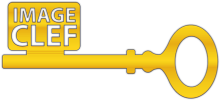- ImageCLEF 2025
- LifeCLEF 2025
- ImageCLEF 2024
- LifeCLEF 2024
- ImageCLEF 2023
- LifeCLEF 2023
- ImageCLEF 2022
- LifeCLEF2022
- ImageCLEF 2021
- LifeCLEF 2021
- ImageCLEF 2020
- LifeCLEF 2020
- ImageCLEF 2019
- LifeCLEF 2019
- ImageCLEF 2018
- LifeCLEF 2018
- ImageCLEF 2017
- LifeCLEF2017
- ImageCLEF 2016
- LifeCLEF 2016
- ImageCLEF 2015
- LifeCLEF 2015
- ImageCLEF 2014
- LifeCLEF 2014
- ImageCLEF 2013
- ImageCLEF 2012
- ImageCLEF 2011
- ImageCLEF 2010
- ImageCLEF 2009
- ImageCLEF 2008
- ImageCLEF 2007
- ImageCLEF 2006
- ImageCLEF 2005
- ImageCLEF 2004
- ImageCLEF 2003
- Publications
- Old resources
You are here
ImageCLEFrecommending
Motivation
In recent years cultural heritage organisations have made considerable efforts to digitise their collections, and this trend is expected to continue due to organisational goals and national cultural policies. Thus media archives have not only exponentially increased in size, but now hold contents in various modalities (video, image, text). Even when structured metadata is available it is still difficult to discover the contents of media archives and allow users to navigate multiperspectivity in media collections. Content-based recommendation systems can help but there is limited understanding how well these perform and how relevant they are for the final end users. Moreover, the system used so far have not addressed the new user requirements of more transparency and explainability of the algorithms used.
News
To be added soon.
Task Description
The task targets a key infrastructure for researchers and heritage professionals: Europeana. With over 53 million records, the single search bar that served as the main access point was identified as a bottleneck by many users. Thus, the strategy has gradually shifted towards exploration of the available collections based on themes. Now users can explore over 60 curated digital exhibitions, countless galleries and blog posts. While there is a system in place to recommend individual items given a query item, the recommendations for editorials are done at the moment only manually. For instance when a new blog is created, the author would manually provide a list of related galleries, blogs or exhibitions that have been already published.
The task requires participants to devise recommendation methods and systems, apply them in the supplied data set gathered from Europeana and provide a series of recommendations for items and editorials. The task is thus divided into two sub-tasks:
- given a list of items provide a list of recommended items;
- given an editorial (Europeana blog or gallery) provide a list of recommended editorials.
- 30.11.2023: registration opens for all ImageCLEF tasks
- 22.04.2024: registration closes for all ImageCLEF tasks
- 17.01.2024: training/development data release starts
- 14.03.2024: test data release starts
- 06.05.2024: deadline for submitting the participants runs
- 13.05.2024: release of the processed results by the task organizers
- 31.05.2024: deadline for submission of working notes papers by the participants
- 21.06.2024: notification of acceptance of the working notes papers
- 08.07.2024: camera ready working notes papers
- 09-12.09.2024: CLEF 2024, Grenoble, France
- Alexandru Stan, <as(at)in-two.com>, IN2 Digital Innovations, Germany
- George Ioannidis, <gi(at)in-two.com>, IN2 Digital Innovations, Germany
- Bogdan Ionescu <bogdan.ionescu(at)upb.ro>, Politehnica University of Bucharest, Romania
- Hugo Manguinhas, <hugo.manguinhas(at)europeana.eu>, Europeana Foundation, Netherlands
<\ul>
Data
For the task a new dataset based on Europeana items and editorials will be provided to the participants. The individual items in the dataset will include a wealth of metadata based on the Europeana Data Model (EDM) schema. Editorials will be either Galleries (containing a title, optional description and list of items which make it up), or blog posts (containing a title, text in English and a number of items). It should be noted that although all data items follow EDM the quality of the metadata is not perfect, with some data fields being potentially somewhat ambiguous, or at least used sometimes in a creative way by the original data providers (especially with some overlap sometimes in what ends up in "format", "medium", "type" and "subject".
Evaluation methodology
Performance will be evaluated on the basis of the recommendations that are provided calculating precision, defined as the number of relevant recommendations divided by the number of all recommendations. For doing this we will use ground truth data for each of the task and each of the queries we will provide. Furthermore, we will compute average precision for each task, submission and the total number of submission(s) of a team.
Participant registration
Please refer to the general ImageCLEF registration instructions
Recommendation Task Schedule
Submission Instructions
Please note that we will accept maximum 1 submission per day and 10 per team.
More to be added soon.
Results
To be added soon.
CEUR Working Notes
To be added soon.
Citations
To be added soon.
Contact
Organizers:
Acknowledgments
CUHE has indirectly received funding from the European Union's Horizon 2020 research and innovation action programme, via the AI4Media Open Call #1 issued and executed under the AI4Media project (Grant Agreement no. 951911).
